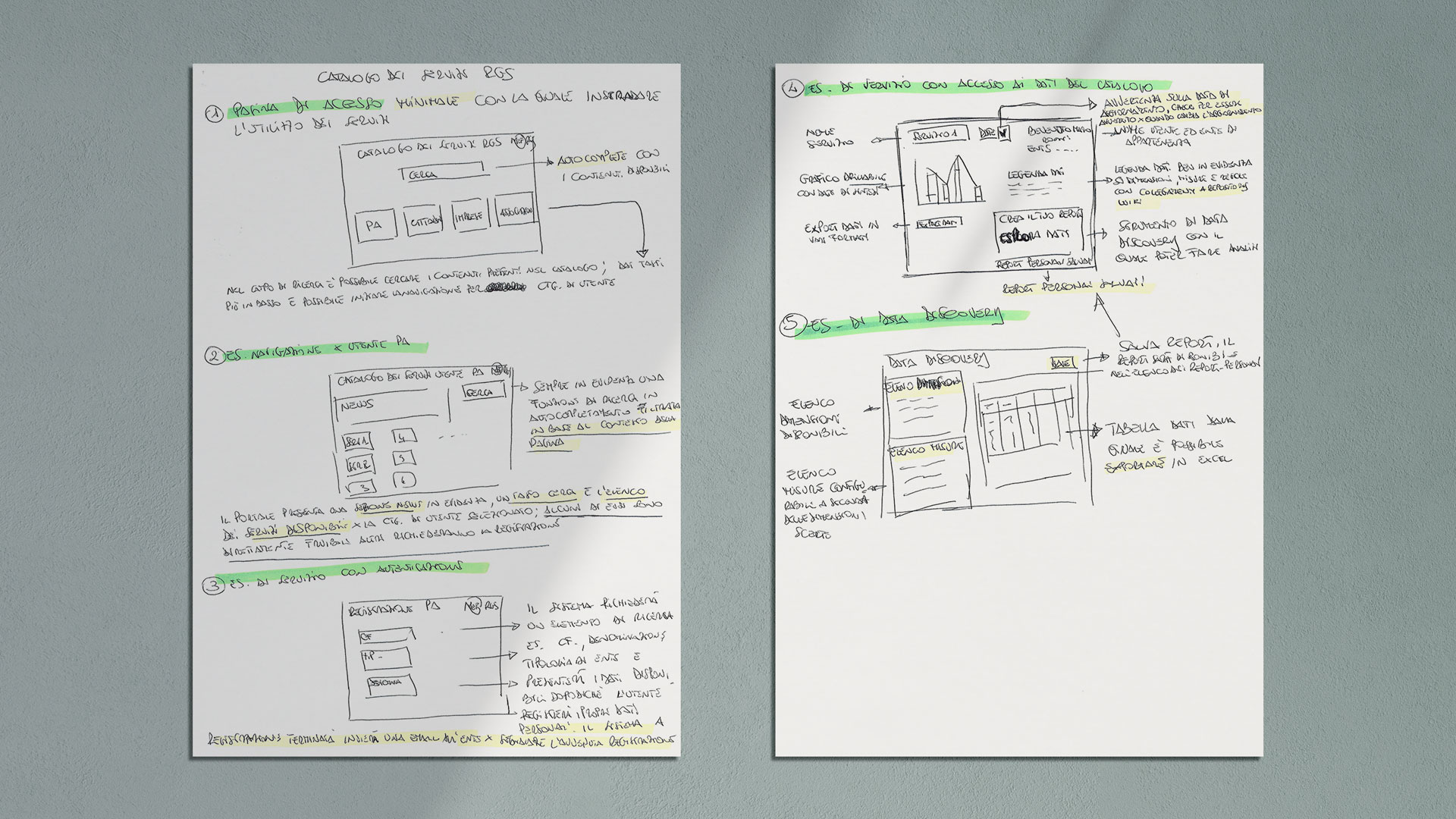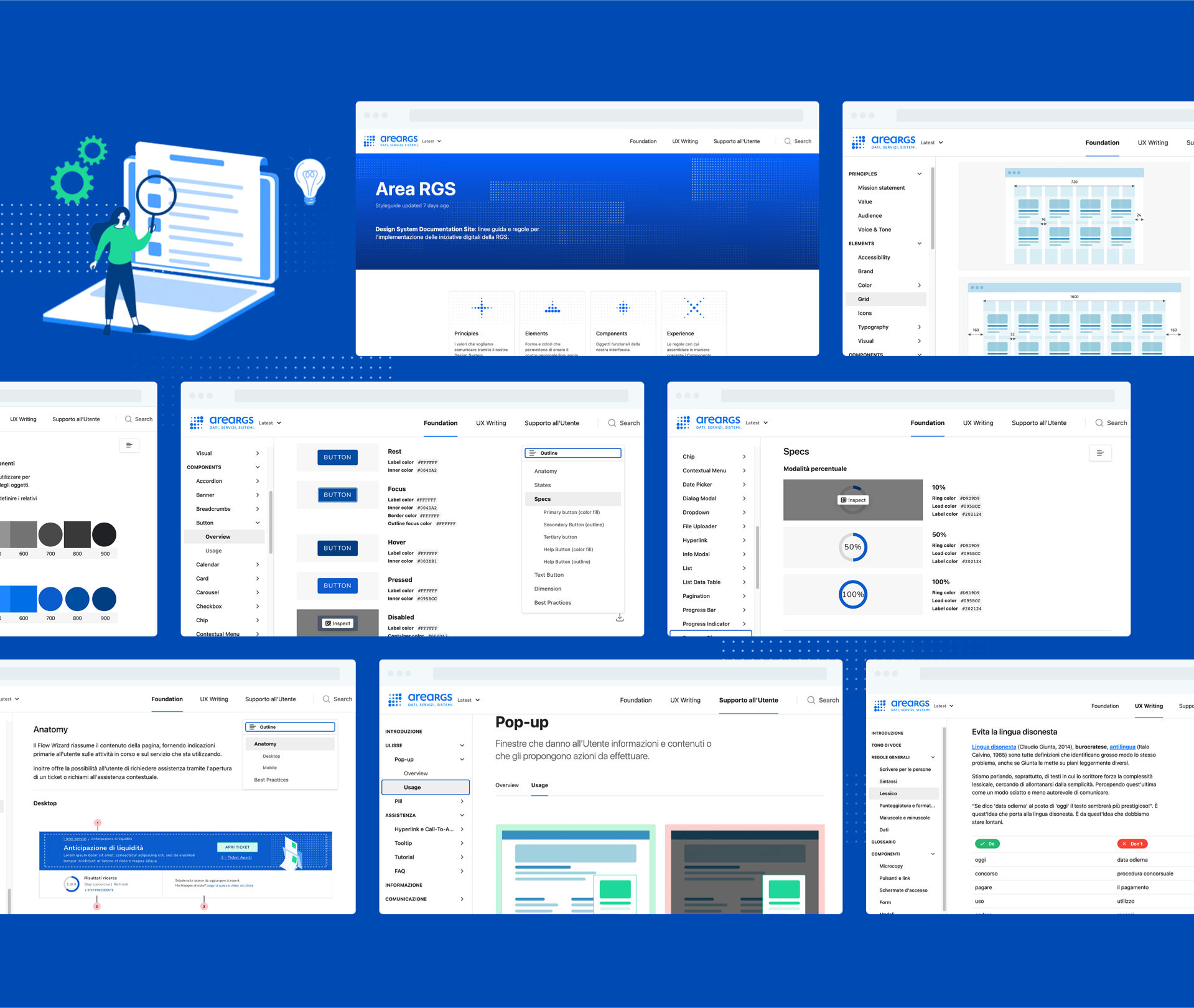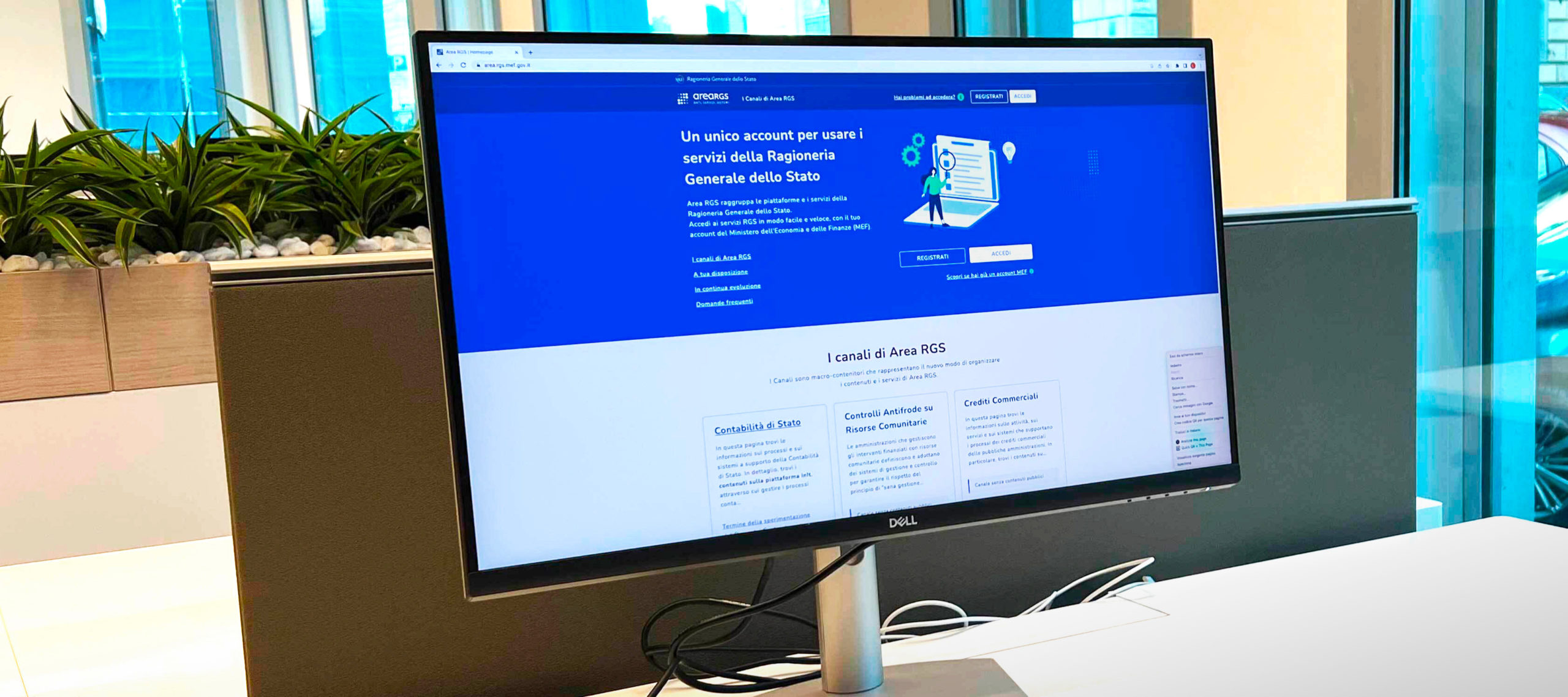THE STARTING POINT
Reforming Platforms and Services to simplify operations
Area RGS is a wide-ranging project that stems from the desire of the State General Accounting Office to restructure the entire range of Platforms, Systems and Services for the management of accounting and public finance, through an ambitious standardisation programme that involves both the Central Public Administration and its peripheral branches.
The services for the accounting and financial management of the Italian State, previously provided through heterogeneous systems with different origins, assumptions and service dimensions, converge with the evolution of the project within a single integrated ecosystem with simplified, clear and uniform rules and models of integration, management and use, both for those who provide the services and for those who benefit from them.
The main challenge posed by the context relates first of all to the scale of the activity: this is a project involving numerous skills and areas of specialisation, cultures, realities, people and teams.
THE STARTING POINT
Reforming Platforms and Services to simplify operations
Area RGS is a wide-ranging project that stems from the desire of the State General Accounting Office to restructure the entire range of Platforms, Systems and Services for the management of accounting and public finance, through an ambitious standardisation programme that involves both the Central Public Administration and its peripheral branches.
The services for the accounting and financial management of the Italian State, previously provided through heterogeneous systems with different origins, assumptions and service dimensions, converge with the evolution of the project within a single integrated ecosystem with simplified, clear and uniform rules and models of integration, management and use, both for those who provide the services and for those who benefit from them.
The main challenge posed by the context relates first of all to the scale of the activity: this is a project involving numerous skills and areas of specialisation, cultures, realities, people and teams.
Working Together: Managing Complexity and the Value of Competencies
The people involved in the development of the Area RGS Programme, belonging to the various structures involved, number substantially in the hundreds, some of which are permanently active in the project and others who are activated on the basis of the contribution they are called upon to provide along the standardisation chain of the solutions, within a broad and structured organisational model.
The organisation of the vast portfolio of initiatives included in the Programme immediately emphasises organisational aspects, the development of collaboration and the accompaniment of change; in fact, the Programme touches on all the skills, the sensitivities – the stories – behind what RGS has been delivering over the last 15/20 years, addressing issues that can be traced back to
- business orientation;
- planning of the activities needed to design and evolve Services;
- characteristics of the user experience, use of content, use of the Services and Systems involved;
- technological architectures;
- support and assistance activities;
- knowledge-management system management.
THE STRATEGY
Changing the approach: from a single service to an ecosystem of integrated services
Area RGS is a Transformation Programme and, like all programmes that aim to bring about significant and permanent change, it consists of multiple elements.
First and foremost, it is a Digital Platform: a place where the various business communities operate, and to which they refer to find information and services to support their activities and fulfilments. In addition, Area RGS is the single point of access to the Services of the State General Accounting Office, an ecosystem in which the user can range among all the Services to which, for various reasons, he can access and with which he interacts in a standardised manner designed to accompany and support him in case of need.
Among the most important Services integrated within Area RGS it is worth mentioning:
- InIt, the RGS ERP (Enterprise Resource Planning) system supporting the accounting processes of the Public Administrations; the system integrates financial, economic and capital accounting and analytical accounting by Cost Centres.
- ReGiS, the system that responds to the objective of creating a single information system through which the actors involved can perform the management, monitoring, reporting and control functions of the various components of the PNRR.
Area RGS is a user experience built on user paradigms that add up to create a dialogue and exchange with the user according to his needs:
- interact with the Services and operate the Systems;
- acquire information to know the details of a service or an administrative procedure;
- be supported when faced with problems, either in self-service mode or following specific requests for assistance;
- remain updated and receive timely communications on the evolution of the ecosystem.
A silent revolution for a new service model
Area RGS is much more than the service proposal it offers its users.
It is a new production and management model for RGS digital solutions that bring the Administration closer to the most efficient organisations on the global market.
Area RGS is a system with its own workflow and production lifecycle. On the one hand, it centralises the rules, guidelines and methodologies for developing and delivering Services. On the other, it leaves the individual organisational contexts of the Administration the freedom to operate according to independent roadmaps and business assumptions. It is not, however, a simple, albeit broad Design System whose elements it is hoped will be generically adhered to: Area RGS defines the business development model, takes care of the value assumptions of the service mission to be sustained, proposes and affirms a single technical context for the development of service experiences that is the same for all environments of use, resolves fragmentation and heterogeneous interpretations, guaranteeing order, uniformity and alignment with the expected level of service.
Area RGS is a single delivery platform in which the path of integration, development, storytelling and assistance of each individual service is “given”, unique and mandated in the common components where it is clearly respectful of the different information and transactional dimensions that individual contexts express.
Area RGS orients its work starting from a broader interpretation of the very concept of Design System: from a simple device for the creation of touchpoints and digital products, to theory, practice, language – a real business tool – that redefines the service mission of a large public organisation, RGS.
The countless activities, necessary to guarantee the ambitious scope of the Programme, are developed within an organisational model that involves, aligns and prepares all stakeholders for the required performance.
Within the organisational and product aspects, which the Programme standardises and defines, of particular importance are the patterns of usability and accessibility, which the Platform is tasked to respect. Equally important are the editorial, textual and UX Writing contents that are drafted, edited and published by a specific Editorial Board, in order to guarantee the interested communities timely updates and, more generally, clear, comprehensible and authoritative information.

A journey back into its Service offering
The project, in its first phase, investigated new service hypotheses thanks to design sprints and product discovery phases with selected stakeholders.
Specifically, the Area RGS project started from the restructuring of the RGS Service Catalogue, a very complex list of Services, Platforms and Systems for the consultation and exchange of accounting and public finance data. The analysis of the current state of the entire range of Services was necessary in order to consolidate the picture of the situation and subsequently be able to activate new and more conscious planning and implementation phases.
Born from the rib of a census and reorganisation initiative of the Service Catalogue, the RGS Area Programme subsequently set itself the theme of introducing new production models of digital solutions that would be interpreters of the challenge but that, at the same time, would be aware of the characteristics of the context and therefore applicable and effective.
In order to manage the design and implementation phases more efficiently, a Hybrid Agile Framework was introduced, i.e. a methodology that combines agility paradigms with other lifecycles, models and cultures strongly influenced, in the case of Area RGS, by the practices of digital service design.
The methodological and organisational framework of the initiative has enabled the product management activities, which, moreover, will accompany the evolutions of the ecosystem for a long time to come, to develop contributions and increments on a frequent basis and thanks to the critical contribution of all the stakeholders involved.

CHANGES AND BENEFITS
The Design System as a business evolution management device
All complex projects generally involve many stakeholders and many organisations gathered around a working table, which is vast and heterogeneous; this involvement of people and structures invests various aspects and produces repercussions and effects on several areas of the realities involved.
Specifically, the Design System of Area RGS, as a living organism in perpetual evolution, is enriched by the contributions of stakeholders in a constant dialogue mechanism. On the one hand there are the central directives, to be absorbed and put into practice on a daily basis, which Area RGS delivers and shares with all the initiatives being integrated, and on the other hand there are the activities for the creation of Services, Platforms and Systems that constantly propose new requirements to the Design System to accompany the development of the service experience under construction.
And it is thanks to this constant contamination that a potentially complex problem such as the management of innovation in the RGS Services can benefit from contributions that define and strengthen its intentions, strategies and, in a word, its identity. In this sense, the need to find service responses that are always new but consistent with the strategic design, makes the Design System the true moment in which the strategies and initiatives at the service of the standardisation promoted by Area RGS, are generated and, finally, the place in which they find full fulfilment.
Designing according to a shared organisational model
In this context, it becomes necessary to implement an organisational model that can support the desired transformation. This model includes roles, ceremonies, bodies, teams, competencies and coordination centres: a set of rules, a ‘pact’ that the stakeholders involved mutually sign to achieve a convergence of values and efforts towards a common goal.
This concerns both the characteristics to be guaranteed to the solutions, and the way of operating in the analysis, design and implementation phases of the Systems.
The need to intervene in the front-stage as well as in the back-stage of the initiative therefore requires two distinct plans of intervention: for the front-stage, governance of the project, for the back-stage, governance of the model. Project governance is the set of rules and practices to develop the different activities, manage events and teams and has, as its overall objective, the development of the project. With model governance, on the other hand, the updating and evolution of the model itself is managed, following continuous improvement cycles to ensure that the programme’s main operating mechanism is punctually aligned with the evolutions proposed by the business.
Experience of change
The Area RGS project represents a rather unprecedented business case in the panorama of digital service delivery in the Public Administration. Accompanying an institution of this magnitude and relevance, in the path of standardising the enormous wealth of Services and solutions at its disposal, calls for the best organisational, product and relationship management resources.
But this is only the surface. Instead, the design, facilitation and governance of a new production model and related mechanisms constitute the cornerstone of this initiative. The aim is to converge towards a model of governed development, which centralises the rationale and strategies but feeds on the contributions, ordered, aligned and coherent, of the multiple branches into which the management of public accounting and finance is articulated. This approach allows RGS to come closer to the dynamic and efficient product-companies on the market, as it allows the entire business model to be condensed within its single offering. This ensures greater efficiency in the implementation of development strategies and greater consistency in the service offering.
Providing support to the strategic direction behind these wills means, in conclusion, being able to contribute to the creation of new value, the realisation of which is written in the thousands and thousands of transactions that are entered into the digital systems every day, as well as in the renewed awareness of the bodies of an Institution that renews its ability to become, once again, an authoritative agent of change.
